How To Reduce Acne Naturally affects millions of people around the world. Many are looking for natural ways to fight this common skin issue. This article will cover natural remedies and lifestyle changes to help reduce acne and improve skin health.
Key Takeaways
- Natural remedies for acne can be effective and gentle on the skin
- Identifying and addressing the underlying causes of acne is crucial
- Incorporating lifestyle changes, such as maintaining a healthy diet and reducing stress, can significantly improve skin health
- Over-the-counter treatments can be a helpful supplement to natural approaches
- Consulting a dermatologist is recommended for persistent or severe acne cases
Understanding Acne
Acne is a common skin issue. It happens when oil, called sebum, mixes with dead skin cells and blocks pores. This mix lets bacteria like Propionibacterium acnes (P. acnes) grow. These bacteria cause inflammation, leading to pimples, blackheads, and cysts.
What Causes Acne?
Many things can lead to acne, including:
- Hormonal changes: Hormonal shifts, like during puberty or certain health conditions, can make oil glands work more. This means more sebum is made.
- Certain medications: Some drugs, like corticosteroids and lithium, can make acne worse.
- Restrictive clothing: Wearing tight clothes can trap sweat and oil, clogging pores.
- Endocrine disorders: Issues with the endocrine system, like polycystic ovary syndrome (PCOS), can mess with hormone balance and cause acne.
- Genetics: Some people might get acne because of their genes.
- Smoking: Smoking can make acne worse and increase the risk of getting it.
Knowing what causes acne is key to finding natural ways to deal with it.
Natural Remedies for Acne
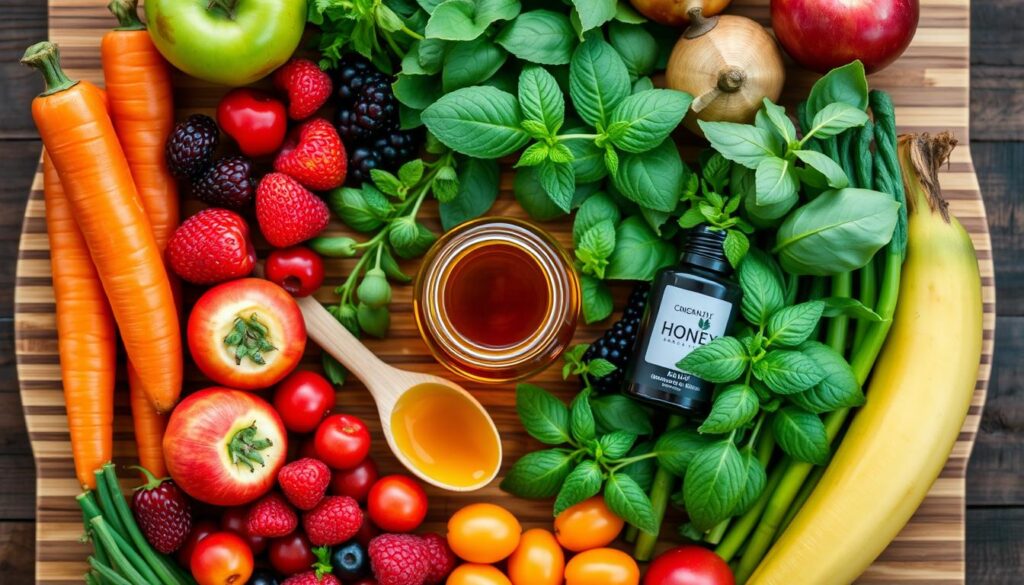
Tea tree oil and apple cider vinegar are two popular natural treatments for acne. They can help reduce acne’s appearance. But, it’s crucial to use them carefully.
Tea Tree Oil for Acne
Tea tree oil is known for its antibacterial and anti-inflammatory properties. It might help lessen acne sores. Always mix it with a carrier oil before applying, as it can be drying.
Studies show it’s effective for mild to moderate acne. This makes it a favorite among natural treatments.
Apple Cider Vinegar for Acne
Apple cider vinegar is another natural option for acne. Its citric acid can kill bacteria and lessen scars. But, mix it with water first, as it can irritate the skin.
Before trying these remedies, talk to a dermatologist. They can cause irritation if not diluted right. Also, remember, natural remedies might take longer to work than others.
How To Reduce Acne Naturally
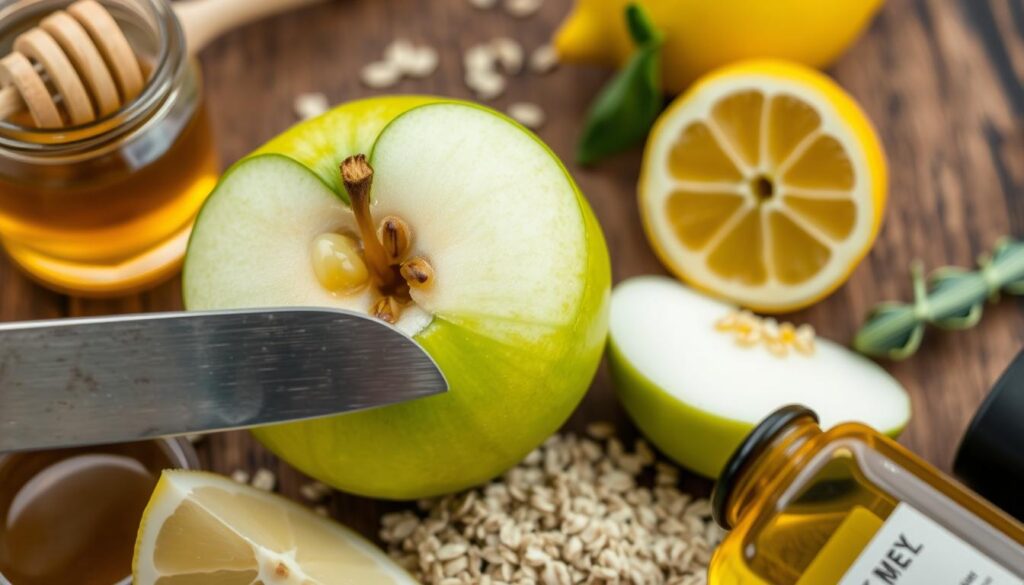
If you’re dealing with acne, you might want to try natural remedies. These remedies may not have a lot of scientific proof, but they can help balance your skin’s oil, lessen inflammation, and heal. Some top natural ingredients for fighting acne include:
- Argan oil – It’s full of antioxidants and fatty acids. Argan oil can manage sebum production and lessen inflammation.
- Jojoba oil – It’s like your skin’s natural oils. Jojoba oil can clear pores and keep oil levels in check.
- Aloe vera – It’s known for soothing and healing. Aloe vera can lessen redness and help skin repair.
- Honey – Honey has antibacterial and anti-inflammatory effects. It can fight bacteria that cause acne and calm inflamed skin.
- Zinc – This essential mineral can control oil production and reduce swelling.
- Green tea – It’s full of antioxidants. Green tea can lessen inflammation and fight bacteria that cause acne.
- Echinacea – This herb has anti-inflammatory and antimicrobial properties. It may help fight acne.
- Rosemary – It’s astringent and antibacterial. Rosemary can tighten pores and lessen acne.
- Coconut oil – It’s moisturizing and antibacterial. Coconut oil can soothe and heal skin prone to acne.
Remember, these natural ingredients might help with acne, but they might not work for severe or ongoing cases. Always talk to a healthcare professional before trying new treatments, natural or not.
Lifestyle Changes for Acne Prevention
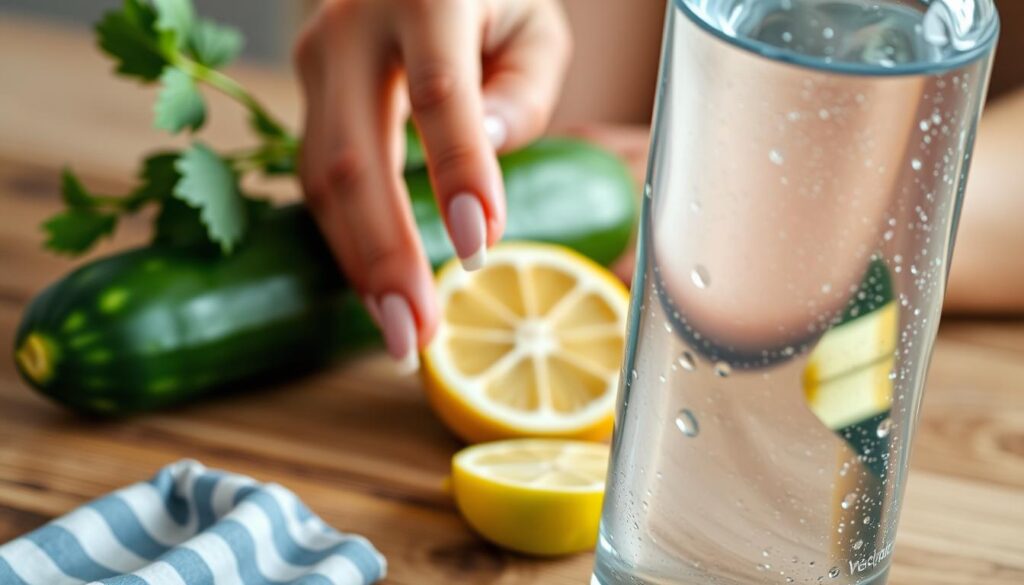
Natural remedies can help with acne, but lifestyle changes are key too. Making simple changes daily can boost your skin’s health and look.
Avoid Touching Pimples
Not touching pimples is a top tip for preventing acne. Touching them spreads bacteria and irritates the skin, causing more inflammation and scars. Try not to pick at your skin and stick to gentle, effective ways to clean and treat it.
Staying Hydrated
Drinking lots of water is good for your skin and acne prevention. Not drinking enough water can make your skin dry, leading to more oil production and clogged pores. Drinking water helps keep your skin’s oil in balance and makes it look clear and bright.
| Lifestyle Changes | Benefits for Acne Prevention |
|---|---|
| Avoid touching pimples | Prevents the spread of bacteria and further irritation |
| Staying hydrated | Helps regulate oil balance and maintain skin health |
| Using oil-free skincare products | Prevents clogged pores and excess oil production |
| Choosing the right cleanser | Removes impurities without over-drying the skin |
| Managing stress | Reduces hormonal fluctuations that can contribute to acne |
Adding these lifestyle changes for acne to your daily life helps with acne prevention tips. These changes support your skin’s health and appearance. Remember, small changes can make a big difference in your journey to clear skin.
Over-the-Counter Treatments
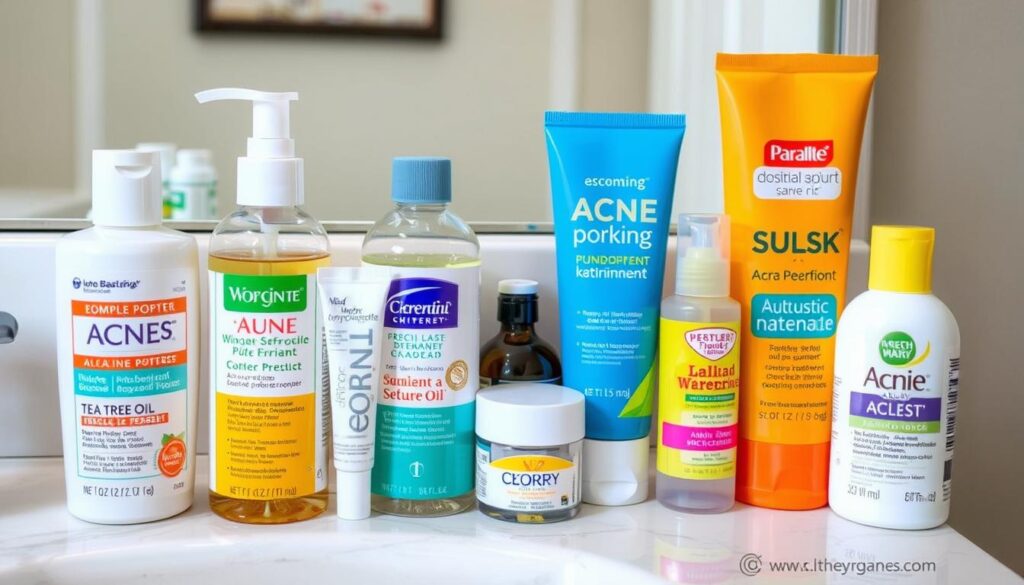
Natural remedies can help with mild to moderate acne. But, for severe or ongoing acne, over-the-counter (OTC) acne medications might be needed. These products often have acne-fighting ingredients like salicylic acid, benzoyl peroxide, niacinamide, or retinoids. These ingredients help clear pores, kill bacteria, and lessen inflammation.
Over-the-counter acne treatments work well for many people. However, they can also cause side effects such as dryness, redness, and irritation. Always follow the product instructions and start with a lower concentration to see how your skin reacts.
| Active Ingredient | How It Works | Potential Side Effects |
|---|---|---|
| Salicylic acid | Helps unclog pores and exfoliate the skin | Dryness, redness, peeling |
| Benzoyl peroxide | Kills acne-causing bacteria and dries out pimples | Dryness, bleaching of clothing/towels |
| Niacinamide | Reduces inflammation and redness | Mild irritation or tingling |
| Retinoids (e.g., adapalene) | Unclogs pores and promotes cell turnover | Dryness, redness, peeling |
When using over-the-counter acne treatments, be patient and consistent. It might take weeks to see results. If your acne doesn’t get better or gets worse, see a dermatologist for advice.
When to See a Dermatologist
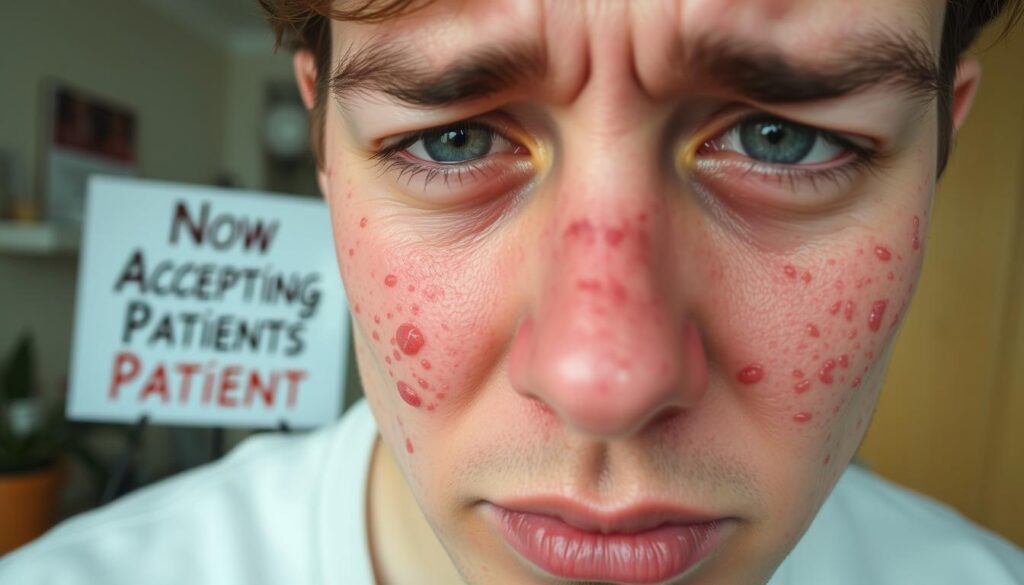
Home remedies and over-the-counter treatments can help with mild acne. But sometimes, you need to see a dermatologist. When should you make an appointment with a skin specialist?
If your acne hurts a lot, is often infected, or is deep under the skin, you might need more help. If your acne doesn’t get better with what you’re using, it could mean there’s an underlying issue.
Seeing a dermatologist is a good idea if your acne covers a big area of your face or body. Dealing with widespread breakouts can be tough without expert care. Also, if acne makes you feel really down or affects your confidence, a dermatologist can help.
A dermatologist can offer severe acne treatment and figure out if your acne is linked to other health issues. They can make a treatment plan that targets the real cause for the best results.
Deciding when to see a dermatologist for acne is up to you, but it’s key to get help if your acne is bad, doesn’t go away, or affects your life. With the right treatment, you can get clearer skin and feel better about how you look.
Also Read: Best Essential Oils For Skin – Unlock Radiant Beauty
Conclusion
Acne can be tough on the skin, but there’s hope. Natural remedies and lifestyle changes can help. Tea tree oil and apple cider vinegar are great for fighting acne.
Keeping a good skin care routine, managing stress, and drinking plenty of water are also important. These steps can help reduce acne.
Even though some natural treatments aren’t fully proven, trying them out can be helpful. If your acne is bad or doesn’t get better, see a dermatologist. They can give you the best advice.
Learning about acne, trying natural remedies, and changing your lifestyle can lead to better skin. This article has given you useful tips for clear, healthy skin. It’s a great guide for those looking for natural ways to fight acne.
FAQs
Q: What are some effective home remedies for acne?
A: Many home remedies for acne include using aloe vera, green tea, and tea tree oil gel, which may help improve acne by reducing inflammation and bacteria on the skin.
Q: How can I get rid of acne naturally?
A: To get rid of acne naturally, consider incorporating natural acne treatments such as essential oils, maintaining a healthy diet, and practicing good skincare habits to prevent acne breakouts.
Q: What causes acne breakouts?
A: Acne breakouts are caused by a combination of factors, including excess sebum production, clogged pores, bacteria, and skin inflammation. Understanding these causes can help in the treatment of mild to moderate acne vulgaris.
Q: Can green tea help treat acne?
A: Yes, green tea extract is known for its anti-inflammatory properties and may help reduce the appearance of acne by decreasing oil production and preventing acne breakouts.
Q: How do I treat hormonal acne naturally?
A: To treat hormonal acne naturally, focus on lifestyle changes, such as a balanced diet, stress management, and using natural acne treatments like aloe vera and tea tree oil, which may help reduce hormonal influences on acne.
Q: What are the best treatments for acne?
A: The best treatments for acne often include a combination of topical treatments like benzoyl peroxide, salicylic acid, and natural remedies such as green tea and essential oils to effectively treat acne.
Q: How can I prevent acne?
A: To prevent acne, maintain a regular skincare routine, avoid touching your face, manage stress, and incorporate natural acne treatments that may help reduce the risk of developing acne.
Q: Is adult acne different from teenage acne?
A: Yes, adult acne often occurs due to hormonal changes or stress and may require different treatments for acne compared to teenage acne, which is typically linked to puberty and excess oil production.
Q: Can popping pimples worsen acne?
A: Yes, popping pimples can irritate your skin, lead to more inflammation, and increase the risk of scarring, which may worsen acne symptoms rather than provide relief.
Q: What are some common myths about acne treatment?
A: Common myths include the belief that certain foods always cause acne or that you should scrub your face aggressively. In reality, gentle skincare and understanding the causes of acne are more effective for treating acne.
Source Links
- https://www.medicalnewstoday.com/articles/322455
- https://www.healthline.com/nutrition/13-acne-remedies
- https://health.clevelandclinic.org/home-remedies-for-acne




